Last Updated on April 12, 2024 by Kelvin Nielsen
In Georgia, landlords and tenants have certain rights and obligations under GA Code Title 44 Chapter 7 when it comes to repairs.
As a landlord, you have a right to require tenants to make repairs to damages that exceed normal wear and tear. On your part, you must needed or requested repairs within “reasonable” time.
As for your tenant, they have a duty to take care for the facilities, appliances and amenities that you have provided them. They must also report to you any repairs or maintenance their rental property requires within reasonable time.
With all that in mind, the following is a basic overview of the Georgia landlord-tenant law on repairs. As a landlord, familiarizing yourself with your repair obligations can help solidify your landlord-tenant relationship, as well as ensure you don’t find yourself in legal hot soup regarding habitability issues.
Key Takeaways:
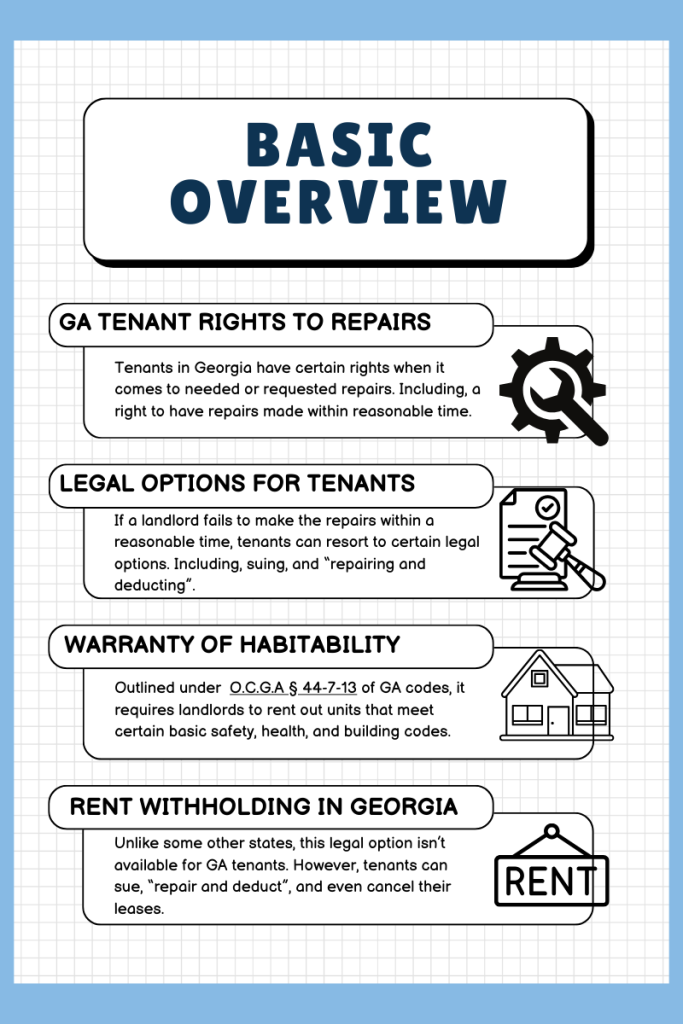
Georgia Tenant Rights to Repairs
Tenants in Georgia enjoy certain rights when it comes to repairs. They include the following.
- A right to live in a habitable home. Georgia Warranty of Habitability (O.C.G.A § 44-7-13) requires landlords to maintain their rental properties in accordance to the state’s basic safety, health, and building codes.
- Have repairs made within a “reasonable” time. How long is “reasonable” will depend on how serious the problem is. In emergency situations, the landlord may need to act within 24 hours to prevent the problem from becoming worse. While, in non-emergency situations, the landlord may need to handle the situation within a couple of days. Ideally, the lease should be able to specifically spell out the specific durations.
- A right to sue the landlord. The tenant can sue you in a small claims court for the cost of damage caused to their belongings. This may especially be the case if the damage resulted in your negligence to repair the issue on time.
- A right to repair the damage and then deduct the costs from future rent payments. This is a legal doctrine usually referred to as “Repair and Deduct”. The tenant must follow a proper procedure for this to work. Firstly, they must notify you of the problem. Secondly, they must give you reasonable time to have the problem fixed. Then, thirdly, they can make the appropriate deductions from rent payments. The tenant must choose a licensed contractor and show proof of the work done by providing receipts (if required).
- Break the lease agreement and move out without penalty. This is another right that the tenant can exercise if you fail in your repair obligations. The problem must, however, have an impact on the tenant’s safety or health.
Warranty of Habitability In Georgia
As a landlord in Georgia, you must only rent out your property after it has met certain health, safety, and building codes. This is as per the state’s warranty of habitability (O.C.G.A § 44-7-13).
The following are the things that make a rental property habitable in the state of Georgia.
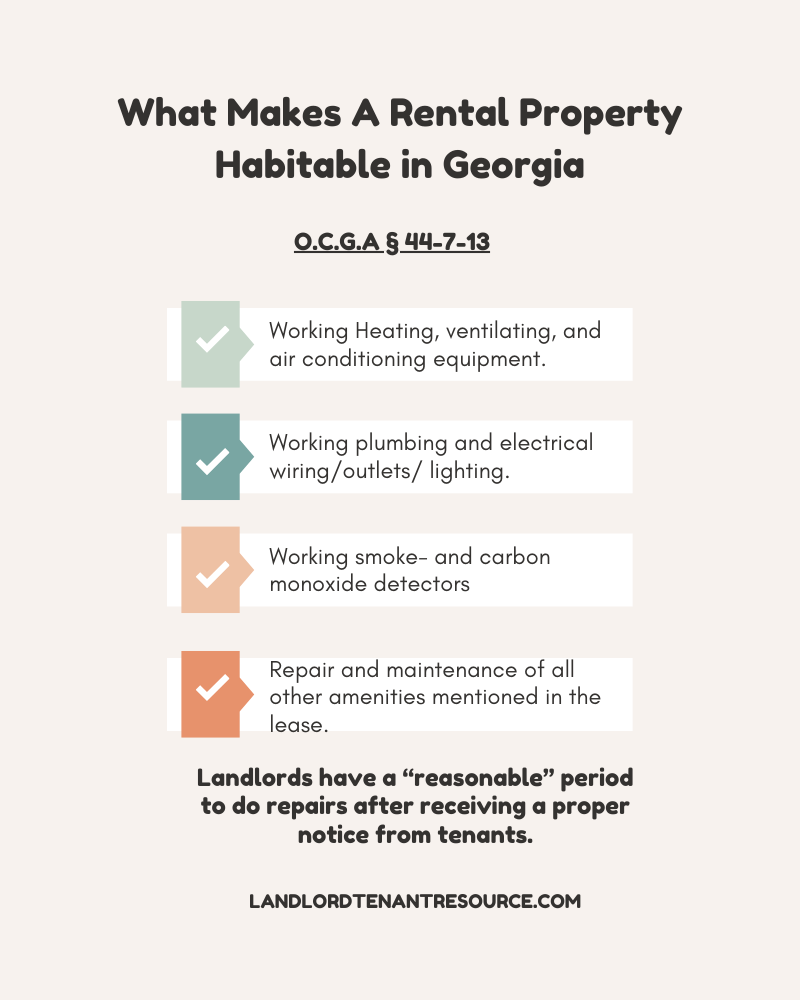
As a landlord, if you fail to provide these things or fail to make needed or requested repairs, the rental property would be deemed uninhabitable. Consequently, the tenant may be able to exercise any of the previously mentioned legal options.
Rent Withholding in Georgia
Can tenants withhold rent for repairs in Georgia? No! Unlike some other states, Georgia tenants cannot withhold rent because their landlord has refused to make repairs. Failure to pay rent would be a serious lease violation, which could eventually lead to their eviction from the property.
Under Georgia law, tenants facing habitability issues can only sue for damages, break their lease agreement, or repair and deduct.
Conclusion
As a landlord in Georgia, you have certain responsibilities under the Georgia Landlord-Tenant Law. Among these responsibilities is fixing issues within reasonable time. How reasonable you must fix them will depend on their severity. Ideally, make sure to state the specific periods in your lease agreement to avoid misunderstanding or confusion.
Sources: GA Code Title 44 Chapter 7, Georgia Warranty of Habitability
Disclosure: The content herein isn’t a substitute for advice from a professional attorney. It’s only meant to serve educational purposes. If you have a specific question, kindly seek expert attorney services.
If you’d like further clarification or even expert legal help from qualified attorneys, don’t hesitate to reach out to us through our services page.

Hi, I’m Kelvin Nielsen, an experienced landlord and accomplished real estate lawyer. My focus is on answering your questions about renting in the hopes of making your life as a renter or a landlord a bit easier.

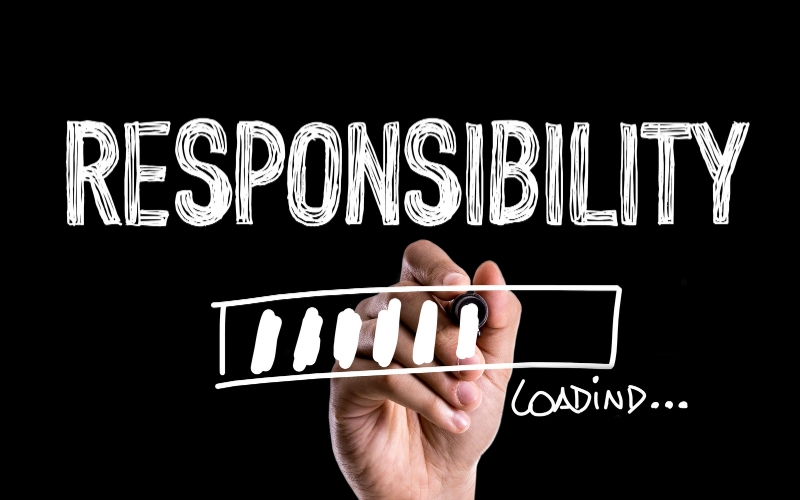

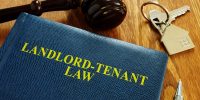
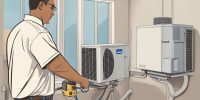

![Can a Tenant Withhold Rent for Repairs? [All 50 US States] Can a tenant withhold rent for repairs?](https://landlordtenantresource.com/wp-content/uploads/2025/03/Untitled-design-200x100.jpg)
